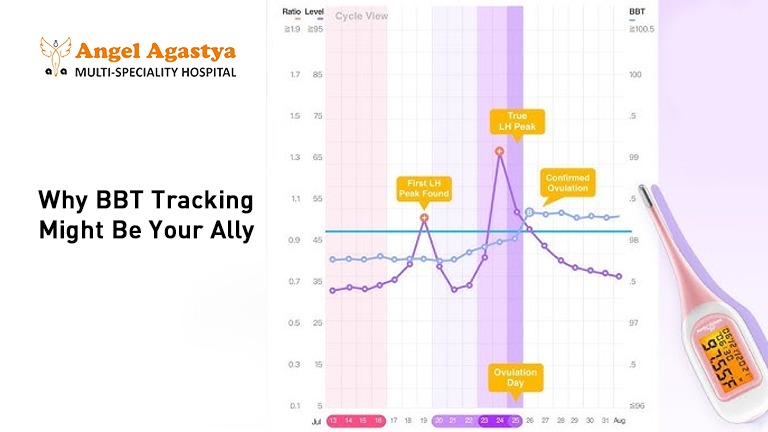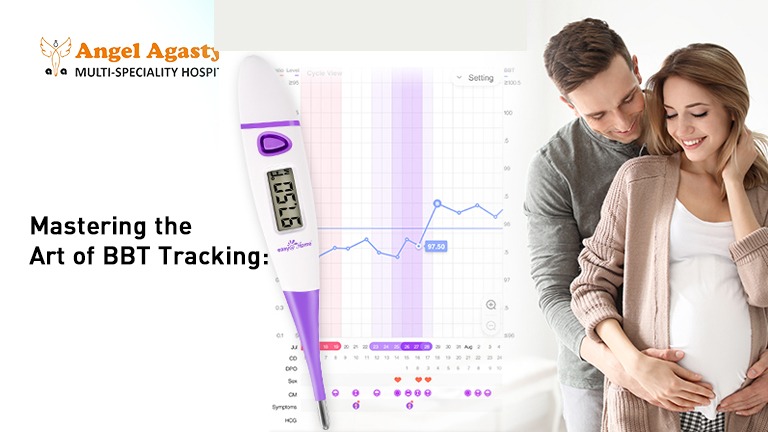Introduction:

Ever heard your girlfriends whisper about “charting their cycles”? ️Chances are, they’re talking about basal body temperature (BBT) tracking, a method gaining popularity in the world of fertility awareness. But is it all it’s cracked up to be? This blog dives into the world of BBT, exploring its potential benefits, limitations, and how to use it effectively. Whether you’re actively trying to conceive (TTC), curious about your cycle, or simply a health enthusiast, this guide is here to empower you with knowledge!
What is Basal Body Temperature (BBT)?
![What is Basal Body Temperature [BBT]?](https://angelagastyahospital.com/wp-content/uploads/2024/07/WhatsApp-Image-2024-06-20-at-12.23.45-1.jpeg)
Your body temperature fluctuates slightly throughout your menstrual cycle. Basal Body Temperature (BBT) tracking involves monitoring your basal body temperature (the lowest temperature you reach during sleep) to identify these subtle changes. After ovulation, progesterone, a hormone released by the ovary, causes a slight rise in basal body temperature. By charting your BBT daily, you can potentially identify a shift in temperature, which might indicate ovulation has occurred.
Why BBT Tracking Might Be Your Ally?
So, why all the buzz about Basal Body Temperature (BBT) tracking? Here are some potential benefits:

- Ovulation Prediction: Identifying your ovulation window can be helpful for both those trying to conceive and those who want to avoid pregnancy naturally (though not a foolproof method).
- Fertility Awareness: Tracking BBT can help you understand your unique menstrual cycle and identify potential irregularities.
- Empowerment: Taking charge of your fertility and understanding your body’s natural rhythms can be a powerful experience.
Before You Dive In: Understanding the Challenges:
While BBT tracking can be a valuable tool, it’s important to understand its limitations:

- Accuracy Concerns: Several factors can affect Basal Body Temperature, such as illness, travel, or even a restless night’s sleep. This can make interpretation of temperature shifts challenging.
- Commitment is Key: BBT tracking requires daily consistency, meaning taking your temperature first thing upon waking, before any activity. This can be demanding for some.
- Not a Guarantee: A temperature rise doesn’t guarantee ovulation, and conversely, ovulation can occur without a clear temperature shift.
Mastering the Art of BBT Tracking:
Ready to give BBT tracking a try? Here’s a step-by-step guide:

- Invest in a Basal Body Temperature Thermometer: Choose a reliable digital BBT thermometer for optimal accuracy.
- Pick a Consistent Time: Aim to take your temperature at the same time each morning, ideally before even getting out of bed.
- Temperature Taking Techniques: Take your temperature orally, vaginally, or rectally (whichever method you find most comfortable and can maintain consistently).
- Charting Your Journey: Invest in a BBT chart or use a fertility tracking app to record your daily temperatures.
- Interpreting the Data: Look for a sustained rise in temperature (typically 0.4-0.8°F) that lasts for at least three days after a low pre-ovulation phase.
Remember, consistency is key! The longer you track, the more reliable your BBT data becomes for understanding your unique cycle.
Alternatives for Fertility Awareness:
While BBT tracking is a popular option, it’s not the only method for fertility awareness. Here are some alternatives to consider:
- Cervical Mucus Tracking: Observing changes in cervical mucus consistency can also indicate your fertile window.
- Calendar Tracking: This method involves tracking your menstrual cycle lengths and using a calendar to predict ovulation based on past cycles (less reliable for irregular cycles).
- Fertility Kits: Over-the-counter ovulation predictor kits detect a surge in luteinizing hormone (LH), which precedes ovulation.
Who Should Consider BBT Tracking?
BBT tracking can be beneficial for women who:
- Are actively trying to conceive and want to identify their fertile window.
- Want to understand their menstrual cycles better and track potential irregularities.
- Are interested in natural family planning methods.
However, it’s important to note that Basal Body Temperature tracking is not a foolproof method for either achieving or preventing pregnancy. It’s also not recommended for women with highly irregular cycles.
Conclusion:
Basal Body Temperature tracking can be a valuable tool for fertility awareness, offering insights into your menstrual cycle and potentially your ovulation window. However, it’s crucial to understand its limitations and the importance of consistency for accurate data.
Remember, you’re not alone in this journey! Consult your doctor or a healthcare.
FAQs:
Is BBT tracking effective for everyone?
Basal Body Temperature tracking can be a valuable tool for many women, but it might not be suitable for everyone. Women with highly irregular cycles or those who struggle with maintaining daily consistency might find other fertility awareness methods more effective.
Can I use a regular thermometer for BBT tracking?
While a regular thermometer might work in a pinch, it’s recommended to invest in a BBT thermometer specifically designed for basal temperature measurement. These thermometers offer higher precision and are often digital for easier reading.
What if I forget to take my temperature one morning?
Missing a single temperature reading won’t necessarily ruin your entire chart. However, the more consistent you are, the more reliable your data becomes for interpreting your cycle. Try to get back on track with your next morning temperature reading.
What if my BBT chart is confusing or doesn’t show a clear temperature shift?
BBT charts can take some time to interpret, especially when you’re first starting. Don’t get discouraged! Tracking for a few cycles can provide a clearer picture of your unique temperature patterns. Consider consulting a fertility specialist or healthcare professional for personalized guidance.
Are there any health conditions that can affect BBT readings?
Yes, various factors can influence your basal body temperature, including illness, stress, travel, certain medications, and even changes in sleep patterns. If you suspect a health condition might be affecting your BBT readings, consult your doctor.
How long should I track my BBT before I can interpret my cycle accurately?
Aim to track for at least 3-6 months to establish a baseline and identify patterns in your temperature shifts. The more data you collect, the easier it will be to predict ovulation and understand your unique cycle.
Can BBT tracking be used to prevent pregnancy?
While BBT tracking can help identify your fertile window, it’s not a reliable method of birth control. There’s a chance of ovulation occurring outside the predicted window, and sperm can survive for several days. Consider alternative birth control methods for reliable pregnancy prevention.
Is BBT tracking safe?
Yes, BBT tracking itself is a safe and non-invasive method. However, if you’re concerned about any underlying health conditions that might be affecting your cycle, consult your doctor.
What are some online resources for BBT tracking and fertility awareness?
Several apps and websites offer BBT charting tools and educational resources on fertility awareness. Ask your doctor for recommendations or explore reputable sources like https://www.plannedparenthood.org/ or https://rarediseases.org/organizations/american-congress-of-obstetricians-and-gynecologists/.
Should I see a doctor if I have concerns about my menstrual cycle or fertility?
Absolutely! Your doctor can address your specific questions, rule out any underlying health conditions, and offer personalized guidance on fertility awareness or family planning methods.

I appreciate the discussion around hormonal health. It’s so important to understand how it affects overall well-being. Our Fertility hospital in Bangalore has the best IVF specialists who are experts in IVF Treatments and offer you the right medical care for your gynec problems. For more info visit our official website https://www.drashwinis.com/ or contact us @+91 94815 38470